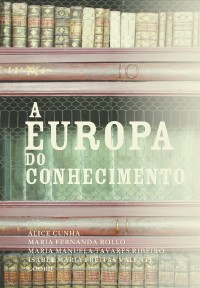Please use this identifier to cite or link to this item:
https://hdl.handle.net/10316.2/46814| DC Field | Value | Language |
|---|---|---|
| dc.contributor.author | Alves, Carlos | |
| dc.date.accessioned | 2019-05-27T11:48:19Z | |
| dc.date.accessioned | 2020-09-04T15:19:16Z | - |
| dc.date.available | 2019-05-27T11:48:19Z | |
| dc.date.available | 2020-09-04T15:19:16Z | - |
| dc.date.issued | 2019 | - |
| dc.identifier.isbn | 978-989-26-1634-6 (PDF) | |
| dc.identifier.isbn | 978-989-26-1633-9 | |
| dc.identifier.uri | https://hdl.handle.net/10316.2/46814 | - |
| dc.description.abstract | The heritage of the European illuminist and Renaissance topography is in ruins. Beneath the rubble of the Europe of values and principles lie the victims of euroscepticism, of globalized terror that coming from the extreme in the disunity find a fertile soil, the south economically rescued from threatened sovereignties, plus those trying to escape from the areas in conflict and whom Europe closes its historically cooperative doors to. Its supportive and integrated strength crumbled, increasing, therefore, an inoperative complicity towards the urge of humanitarian responses to those who choose Europe (less and less of the freedom of movement) motivated by its collaborative tradition to seek for shelter. The transnational and intergenerational discontentment overwhelmed its streets claiming for the attention of its leaders questioned about their leadership. From this unfinished project, a threatened and incomplete Europe stands out, lacking in mutual assistance, as a restricted club with two unequal speeds: north and south. An analytic systematic portrait, historical and comparative, englobing political and social dimensions, shows the myriad of variables and factors that have been stressing the political, religious and cultural regrets throughout Europe. Its synopsis will show, unfortunately, a broken Europe concerning humanism, disaggregated, from which the nationalist and populist obscurantism was born and the new European darkness has emerged. The ultimate question is whether the so‑called Europe of education and knowledge will be able to revitalise itself. That will, undoubtedly, require us to (re)think the role of the political power and the different actors, institutionalized or as individuals, in the (re)definition and development of a Europe of real knowledge. | eng |
| dc.description.abstract | A herança da topografia iluminista e renascentista europeia está em ruínas. Sob os escombros da Europa dos valores e princípios jazem as vítimas do euroceticismo, do terror globalizado proveniente dos extremismos que encontram na sua desunião terreno fértil, de um sul economicamente resgatado de soberanias ameaçadas, mais os que tentam escapar das zonas de conflito a quem fecha as portas historicamente cooperantes. A sua força solidária e integradora esboroou‑se, crescendo uma cumplicidade inoperante face à urgência de respostas humanitárias para os que escolhem a Europa (cada vez menos da livre circulação), motivados pela sua tradição colaboradora e de acolhimento, para se refugiar. Os descontentamentos transnacionais e intergeracionais assoberbaram as suas ruas e reclamam pela atenção dos seus dirigentes questionados na sua liderança. Do seu projeto abalado sobressai o ritmo de uma Europa, de construção inacabada e ameaçada, com défice de entreajuda, clube restrito e a duas velocidades desiguais: a do norte e a do sul. Um retrato analítico sistemático, histórico comparativo, incorporando dimensões políticas e sociais, permite evidenciar a miríade de variáveis e fatores que têm vindo a acentuar os ressentimentos políticos, religiosos e culturais na Europa. A sua sinopse evidenciará, infelizmente, como se verá, uma Europa falida no seu humanismo, desagregada, da qual nascem os obscurantismos nacionalistas e populistas que marcam as novas trevas europeias. A questão lapidar que urge responder é se a Europa dita da educação e do conhecimento, conseguirá revitalizar o seu projeto em crise. Isso exigirá, sem dúvida, (re)pensar o papel do poder político e dos diferentes atores, institucionais ou individuais, na (re)definição e desenvolvimento de uma Europa que se quer, efetivamente, do Conhecimento. | por |
| dc.language.iso | por | - |
| dc.publisher | Imprensa da Universidade de Coimbra | por |
| dc.relation.ispartof | http://hdl.handle.net/10316.2/46806 | por |
| dc.rights | open access | - |
| dc.subject | refugees | eng |
| dc.subject | austerity | eng |
| dc.subject | extremisms | eng |
| dc.subject | crisis | eng |
| dc.subject | EU | eng |
| dc.subject | refugiados | por |
| dc.subject | austeridade | por |
| dc.subject | extremismos | por |
| dc.subject | crise | por |
| dc.subject | UE | por |
| dc.title | A desunião europeia do conhecimento: as novas trevas da europa: crises, papéis, atores, desafios e caminhos | por |
| dc.title.alternative | The European desunion of knowledge: the new darkness of Europe: crisis, roles, actors, challenges and answers | eng |
| dc.type | bookPart | por |
| uc.publication.firstPage | 289 | - |
| uc.publication.lastPage | 338 | - |
| uc.publication.location | Coimbra | por |
| dc.identifier.doi | 10.14195/978-989-26-1634-6_8 | - |
| uc.publication.digCollection | PB | por |
| uc.publication.orderno | 8 | - |
| uc.publication.area | Artes e Humanidades | por |
| uc.publication.bookTitle | A Europa do conhecimento | - |
| uc.publication.manifest | https://dl.uc.pt/json/iiif/10316.2/46814/199906/manifest?manifest=/json/iiif/10316.2/46814/199906/manifest | - |
| uc.publication.thumbnail | https://dl.uc.pt/retrieve/10996782 | - |
| uc.publication.parentItemId | 55102 | - |
| uc.itemId | 67985 | - |
| item.grantfulltext | open | - |
| item.fulltext | With Fulltext | - |
| Appears in Collections: | A Europa do conhecimento | |
Files in This Item:
| File | Description | Size | Format | |
|---|---|---|---|---|
| a_desuniao_europeia_do_conhecimento.pdf | 1.13 MB | Adobe PDF |  |
Items in DSpace are protected by copyright, with all rights reserved, unless otherwise indicated.
